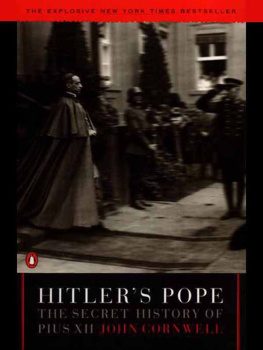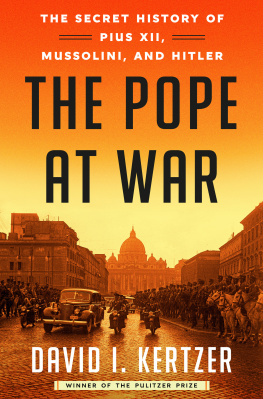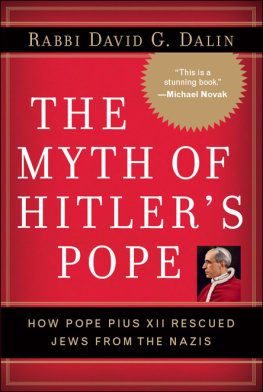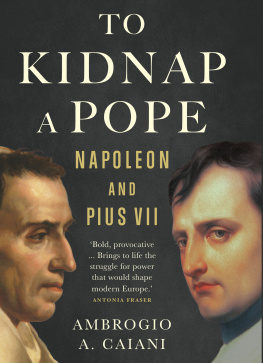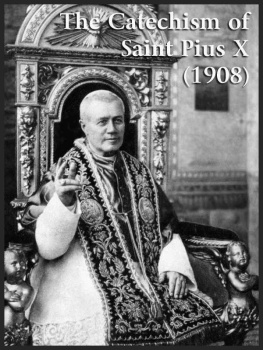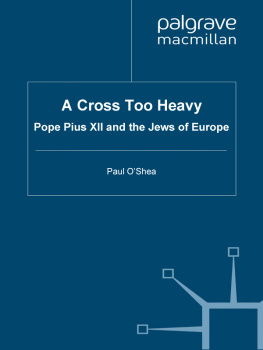PENGUIN BOOKS
Published by the Penguin Group
Penguin Putnam Inc., 375 Hudson Street, New York, New York 10014, U.S.A.
Penguin Books Ltd, 27 Wrights Lane, London W8 5TZ, England
Penguin Books Australia Ltd, Ringwood, Victoria, Australia
Penguin Books Canada Ltd, 10 Alcorn Avenue, Toronto, Ontario, Canada M4V 3B2
Penguin Books (N.Z.) Ltd, 182190 Wairau Road, Auckland 10, New Zealand
Penguin Books Ltd, Registered Offices:
Harmondsworth, Middlesex, England
First published in the United States of America by Viking Penguin,
a member of Penguin Putnam Inc. 1999
Published in Penguin Books 2000
Copyright John Cornwell, 1999
All rights reserved
Care has been taken to trace the ownership and obtain permission, if necessary, for the photographs included in and on this book. If any errors or omissions have occurred, they will be corrected in subsequent printings, if notification is sent to the publisher.
Cornwell, John.
Hitlers pope: the secret history of Pius XII/John Cornwell.
p. cm.
ISBN 978-1-1012-0249-4
Without limiting the rights under copyright reserved above, no part of this publication may be reproduced, stored in or introduced into a retrieval system, or transmitted, in any form, or by any means (electronic, mechanical, photocopying, recording, or otherwise), without the prior written permission of both the copyright owner and the above publisher of this book.
Making or distributing electronic copies of this book constitutes copyright infringement and could subject the infringer to criminal and civil liability.
First edition (electronic): February 2002
PENGUIN BOOKS
HITLERS POPE
John Cornwell is an award-winning journalist and author with a lifelong interest in Catholic and Vatican affairs. He has profiled Pope John Paul II for Vanity Fair and the London Sunday Times Magazine, and has written on Catholic issues for many publications, including the London Observer and the Tablet. His previous book on the Vatican, A Thief in the Night: The Death of Pope John Paul, a bestseller around the world, will be reissued by Penguin next year. In I995 he won the Independent Television Authority award for services to religious journalism.
From 1990 to 1996, John Cornwell was a research fellow at Jesus College, Cambridge, where he now directs the Science and Human Dimension Project. He was elected a fellow of the Royal Society of Literature in 1984.
All successes [Pacelli believed] could only be attained by papal diplomacy. The system of concordats led him and the Vatican to despise democracy and the parliamentary system.... Rigid governments, rigid centralization, and rigid treaties were supposed to introduce an era of stable order, an era of peace and quiet.
Heinrich Brning, German chancellor 193032
Pius XII and the Jews.... The whole thing is too sad and too serious for bitterness... a silence which is deeply and completely in complicity with all the forces which carry out oppression, injustice, aggression, exploitation, war.
Thomas Merton
The cause of the beatification and canonization of Pope Pius XII, who is rightly venerated by many millions of Catholics, will not be stopped or delayed by the unjustifiable and calumnious attacks against this great and saintly man.
Father Peter Gumpel, S.J., relator in the cause of Pius XIIs canonization
Several years ago I was at a dinner with a group of postgraduate students, some of whom were Catholics. The topic of the papacy was broached, and the party got contentious. A young woman asserted that she found it difficult to understand how any right-minded person today could be a Catholic, since the Church had sided with the most pernicious right-wing leaders of the centuryFranco, Salazar, Mussolini, Hitler. Her father was Catalan; her paternal grandparents had suffered greatly at the hands of Franco during the civil war. Then the topic of Eugenio PacelliPius XII, the wartime Popewas raised, and how he had not done enough to save the Jews from the death camps.
In common with many Catholics of my generation, I was only too familiar with that allegation. It had started with Rolf Hochhuths play The Deputy (1963), which depicted Pacelliimplausibly, most Catholics thoughtas a ruthless cynic more interested in the Vaticans stock-holdings than in the fate of the Jews. But Hochhuths play sparked a controversy about the culpability of the papacy and the Catholic Church in the Final Solution, each contribution to the debate prompting a riposte from its opposite extreme. The leading participants, whose work I discuss at the end of this book, mainly focused on Pacellis wartime years. Yet Pacellis influence in the Vatican began during the first decade of the twentieth century and increased over a period of nearly forty years until he was elected Pope in 1939, on the eve of the Second World War. It seemed to me that a fair appraisal of Pacelli, his deeds and omissions, required a more extensive chronicle than any attempted so far. Such a study would expand not only on Pacellis earlier diplomatic activities but on the whole life, including the growth of his evident spirituality from childhood. I was convinced that if his full story were told, Pius XIIs pontificate would be vindicated. Hence I decided to write a book that would satisfy a broad spectrum of readers, old and young, Catholics and non-Catholics alike, who continue to raise questions about the role of the papacy in the history of the twentieth century. The project, I realized, would be no conventional biography, since the impact of an individual pope on global affairs blurs the usual distinctions between biography and history. A pope, after all, believes, along with many hundreds of millions of the faithful, that he is Gods representative on earth.
I applied for access to crucial material in Rome, reassuring those who had charge of the appropriate archives that I was on the side of my subject. Acting in good faith, two key archivists gave me generous access to unseen material: depositions under oath gathered thirty years ago for Pacellis beatification, and also documents in the office of the Vatican Secretariat of State. At the same time, I started to draw together, critically, the huge circuit of scholarship relating to Pacellis activities during the 1920s and 1930s in Germany, works published during the past twenty years but mainly inaccessible to a general readership.
By the middle of 1997, nearing the end of my research, I found myself in a state I can only describe as moral shock. The material I had gathered, taking the more extensive view of Pacellis life, amounted not to an exoneration but to a wider indictment. Spanning Pacellis career from the beginning of the century, my research told the story of a bid for unprecedented papal power that by 1933 had drawn the Catholic Church into complicity with the darkest forces of the era. I found evidence, moreover, that from an early stage in his career Pacelli betrayed an undeniable antipathy toward the Jews, and that his diplomacy in Germany in the 1930s had resulted in the betrayal of Catholic political associations that might have challenged Hitlers regime and thwarted the Final Solution.
Eugenio Pacelli was no monster; his case is far more complex, more tragic, than that. The interest of his story depends on a fatal combination of high spiritual aspirations in conflict with soaring ambition for power and control. His is not a portrait of evil but of fatal moral dislocationa separation of authority from Christian love. The consequences of that rupture were collusion with tyranny and, ultimately, violence.
At the culmination of the First Vatican Council in 1870, Archbishop Henry Manning of Westminster welcomed the doctrine of papal infallibility and primacy as a triumph of dogma over history. In 1997, Pope John Paul II, in his Remembrance document on the Final Solution, talked of Christ as the Lord of History. The time is surely ripe for acknowledgment of the lessons of recent papal history.

